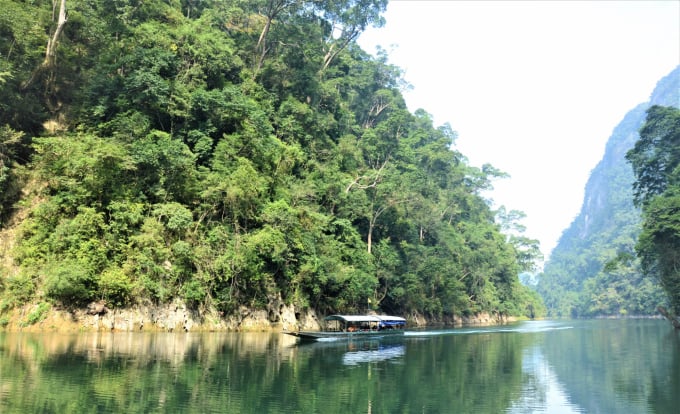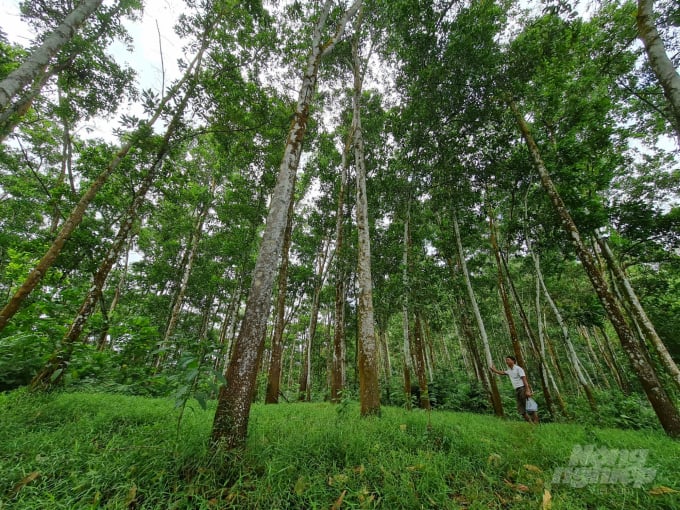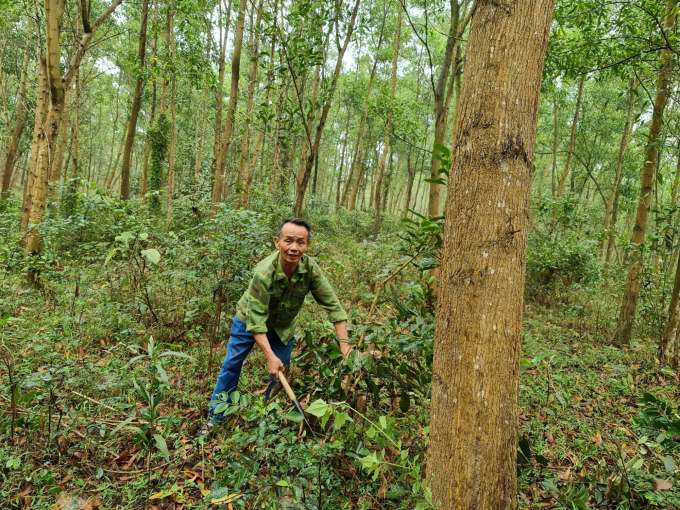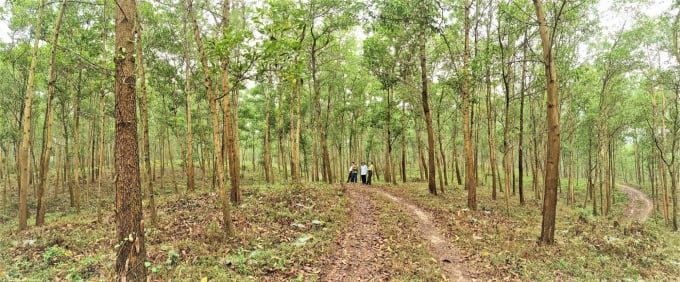May 21, 2025 | 06:28 GMT +7
May 21, 2025 | 06:28 GMT +7
Hotline: 0913.378.918
May 21, 2025 | 06:28 GMT +7
Hotline: 0913.378.918

Forest conservation will result in economic benefits through reducing carbon emissions. Photo: HA.
Forest-carbon trade is an inexorable trend, helping “carbon credit producers” - the forest owners - to become more active in forest protection and development. It is on the other hand the motivation for buyers - usually industrial manufacturers investing in clean-renewable technology. The more vibrant the carbon credit market is, the more signs of the green economy's development it presents.
Carbon is not a “commodity” in literal meaning, but it’s to refer to reducing emissions coupled with an increase in forest reserves will create a disparity between emission and absorption. This reality can be viewed as a “credit” for trading based on the formula “1 carbon credit equals 1 ton of CO2 emission reduction”.
The carbon credits market exists in two forms, voluntary and compulsory. Due to a number of legal problems, leading to the expectation of "walking on both feet" in the long term. Vietnam is following the voluntary option in order to get access to the international carbon credits market.
Approaching this option has certain advantages. Vietnam can sell carbon credits outside and gain more time to construct a legal framework to prepare for the mandatory market in the not too distant future as the implementation of the Paris Agreement on climate change gains global uniformity. It is also the time to both operate and learn from experience to perfect the overall carbon credits market system.
Vietnam has not yet ascertained the domestic trade demand for carbon credits, so the international market is the only channel to generate surplus values from forests.

Expanding planted forest areas will directly benefit forest owners through the carbon credit trade mechanism. Photo: HA.
There is a possibility that an area of forest can provide more carbon credits to buyers than the amount needed. But determining the exact amount of carbon that a forest area can provide requires that appraisers have to assess the actual value of the whole forest area. An independent appraisal from a third party is often expensive but mandatory due to the requirement set by the buyer. Countries therefore often take advantage of the available appraisal results to sell to many buyers in order to save the cost for this segment.
For example, an area of forest may supply 20 million tons of CO2 but the buyer only has an order for 6 million tons, so the seller must find other buyers for the remaining 14 million tons. And since these remaining goods have been appraised, all related parties can save a lot of expenses while having their revenue in a stable increase.
According to regulations, the international carbon market requires sellers to provide a lot of data. Vietnam basically just has parameters on the area of forest providing environmental services, the number of people who use the forest for production activities, and the number of people directly benefiting from the forest.
Lessons from Brazil or Costa Rica show that in order to fully participate in the international market Vietnam needs to update additional information such as carbon stocks (created or absorbed); data of the area, the buyer, the amount paid, the serial number issued for the carbon credits generated from this forest area; the number of carbon credits issued and sold; and the potential quantity of carbon available for trading in international and domestic markets.
Completing the database system not only helps Vietnam (specifically localities with carbon credit reserves) allocate sales quotas but also increases market transparency which is very important in international transactions, eliminating the possibility of related parties reporting and gaining the benefits twice. Specific and accurate data can help sellers decide who to sell to or when to sell to reap more profits.

Specific and accurate data can help sellers decide who to sell to or when to sell to reap more profits. Photo: HA.
According to the assessment of Dr. Pham Van Dien, Deputy Director-General of the Administration of Forestry (MARD), Vietnam possesses great potential and opportunity to participate in the international carbon credit market, therefore we need to soon complete the legal framework and mechanism to profit from this resource.
Vietnam has piloted three major agreements to "sell" carbon credits to the international market up to the present date.
The first is the Emission Reductions Payment Agreements (ERPA) signed with the Forest Carbon Partnership Facility (FCPF) Fund through the World Bank (WB) since October 2020 with the implementation period until 2025. Under the agreement, Vietnam holds responsible for reducing emissions of 10.3 million tons of CO2 on an area of 5.1 million ha (with 3.1 million ha being forest areas) in six North Central provinces and receives financial support of USD 51.5 million.
Commenting on the agreement with the Forest Carbon Partnership Facility (FCPF) Fund, Mr. Ha Cong Tuan, Standing Deputy Minister of Agriculture and Rural Development at that time, said, “Vietnam's emissions reduction program will provide an important source of additional financing to invest in afforestation and reduce deforestation while generating income for forest owners and promoting sustainable development in the North Central region. This can be considered Vietnam’s next step in preparation to participate in the emission reduction payment agreement, heading towards the comprehensive implementation of forest environmental services in the country.”
The second is the Letter of Intent signed between the Ministry of Agriculture and Rural Development of Vietnam and the Organization for Forest Finance Accelerator (Emergent) - the trustee of the Lowering Emissions by Accelerating Forest finance (LEAF) Coalition on the occasion of the recent working trip of Minister of Agriculture and Rural Development Le Minh Hoan - a member of the high-ranking Vietnamese delegation to the 26th UN Climate Change Conference of Parties (COP26).in Glasgow (Scotland) at the end of October.
With this Letter of Intent, Vietnam transfers to LEAF/Emergent 5.15 million tons of CO2 emission reduction from forests in the South Central region and Central Highlands in the 2022-2026 period. LEAF/Emergent will pay for this service with a minimum price of USD 10/ton of CO2, resulting in a total value of USD 51.5 million.
The third is the fact that the Prime Minister a few months earlier allowed Quang Nam to become the first province in the country to pilot the forest carbon credits business in the 2021 - 2025 period with a total expected export credit of 5.2 million tons, particularly 1.2 million tons of CO2 in 2021 alone. Quang Nam has completed the procedures for the international bidding project. According to the latest news, five foreign enterprises have contacted to seek opportunities to invest and purchase carbon credits from Quang Nam.
International practice shows that there are usually 3 forms of a domestic carbon market, including a carbon tax imposition, an emission trading mechanism based on the allocation of emission quotas to industries, and a payment mechanism for forest environmental services.
Vietnam is implementing the third mentioned form, so experts recommend that it is essential to soon deploy both the remaining forms to facilitate the process of full integration into the international carbon market and carbon credits trading regardless of the nature of the market.

According to the assessment of Dr. Pham Van Dien, Deputy Director-General of the Administration of Forestry (MARD), Vietnam possesses great potential and opportunity to participate in the international carbon credit market. Photo: HA.
57 million carbon credits per year
Information from the MARD shows that Vietnam can sell 57 million carbon credits to international organizations each year. Assuming the price is 5 USD/credit, each year the national budget can bring in hundreds of millions of USD.
This is considered a new resource, if known how to fully utilize, will generate a great source of funds to increase income for forest growers, making a significant contribution to the protection and development of forests in Vietnam.
Forest reserve in 2020 is about 990 million m3 and is expected to increase to 1,250 million m3 in the next 10 years. However, in order to take advantage of the potential of forest carbon credits trading, Vietnam needs to improve the legal framework to form carbon markets inside and outside the country.
Thuc An
Translated by Samuel Pham

(VAN) Dong Thap farmers attained an average profit margin of 64% during the summer-autumn 2024 crop (first season), while An Giang and Kien Giang farmers followed with 56% and 54%, respectively.

(VAN) As a doctoral student doing research on renewable energy and electrification at Harvard University, the author shares his musings on electricity, nature, and countryside memories.

(VAN) The decree on Extended Producer Responsibility (EPR) ensures transparent management and disbursement of support funds, avoiding the creation of a “give-and-take” mechanism.

(VAN) Hue City rigorously enforces regulations regarding marine fishing and resource exploitation, with a particular emphasis on the monitoring of fishing vessels to prevent illegal, unreported, and unregulated (IUU) fishing.

(VAN) Hanoi People's Committee has issued a plan on reducing greenhouse gas emissions in the waste management sector with 2030 vision.

(VAN) Vietnam's draft amendment to Decree No. 156 proposes a mechanism for medicinal herb farming under forest canopies, linking economic development to population retention and the sustainable protection and development of forests.

(VAN) In reality, many craft village models combined with tourism in Son La have proven effective, bringing significant economic benefits to rural communities.